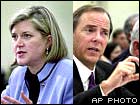Enron: Watkins, Skilling together?
Senate hearing to feature whistleblower Watkins, ex-CEO Skilling, and COO McMahon.
February 25, 2002: 7:17 p.m. ET
|
 NEW YORK (CNN/Money) - Congressional investigators will get another whack at former Enron Corp. CEO Jeff Skilling this week in a hearing that will focus on the energy trading company's use of many off-the-books partnerships.
NEW YORK (CNN/Money) - Congressional investigators will get another whack at former Enron Corp. CEO Jeff Skilling this week in a hearing that will focus on the energy trading company's use of many off-the-books partnerships.
Skilling, along with Enron's current chief operating officer, Jeff McMahon, and whistleblower Sherron Watkins all are slated to appear Tuesday before the Senate Committee on Commerce, Science and Transportation.
The hearing begins at 9:30 a.m. ET, but testimony is expected to begin around 10:30 a.m ET. Initially, all three were to appear together before the Senate panel, but one of the trio doesn't want to appear beside another executive, a person with knowledge of the hearing said. Skilling is not the one complaining, so either Watkins or McMahon is objecting, the source said.
Finalized details of the hearing will be available late Monday, a Senate committee spokesman said.
Who was behind partnerships?
The focus for investigators this time will be Enron's many off-the-book transactions, which the energy trader allegedly used to hide $1 billion in debt. The company's partnerships number about 3,000, and the senators will be probing the purpose behind the partnerships.
Investigators also will be asking the trio who was the mastermind behind the transactions, the spokesman said. Enron's ousted chief financial officer, Andrew Fastow, is credited by many as the chief architect behind the questionable partnerships, from which he allegedly pocketed about $30 million.
Enron's use of the partnerships, which helped inflate profits and hide debt, ultimately led the company to restate earnings and caused investors, customers and trading partners to lose confidence in the company, which filed the biggest bankruptcy in U.S. history on Dec. 2.
Earlier this month, Fastow declined to testify before a House subcommittee and cited his constitutional right against self-incrimination.
While Skilling did talk, the ex-CEO repeatedly told a congressional panel that he did not know that any of the off-the-books partnerships were used by Enron to hide debt. Instead, Skilling blamed a liquidity problem for the energy trader's collapse.
"Skilling claims he didn't know, and he will get asked how this can be, given his responsibilities," a Senate committee spokesman said. "How can he be unaware of this?"
What Skilling knew
A videotape obtained by CNN reveals that Skilling was aware as early as October 2000 that some were questioning Enron's accounting practices.
A Wall Street Journal article, dated Sept. 20, 2000, attacks Enron's use of a technique, called "mark-to-market accounting," that allows companies to include as current earnings those profits they expect from energy-related contracts and derivatives instruments in future periods, sometimes stretching over more than 20 years.
Skilling, speaking at an all employee meeting of Oct. 3, 2000, said the WSJ article was without merit and that Enron's use of such an accounting method was appropriate.
The article also criticized Enron's lack of disclosure regarding its finances.
"Quite frankly we provide more data in our annual report than anyone else in our industry and more data than anyone in any transaction-based industry," Skilling responded.
The tape shows Skilling telling employees that one of the company's goals was to minimize the impact on Enron's balance sheet. Skilling told staff: "(W)e are going to be bringing in partners ... to help us leverage our capital, so that we're putting less capital per unit of revenue and profit growth for the company."
Rep. Henry Waxman (D-Calif.), the ranking Democrat on the House Committee for Government Reform, said the videotape raises important questions about what Skilling knew and his role in promoting Enron's efforts to "minimize the impact" on the company's balance sheet.
"The Oct. 3, 2000 videotape shows, however, that you were aware ten months earlier of a Sept. 20, 2000 article in the WSJ that raised serious questions about Enron's financial soundness," Waxman said in a letter to Skilling.
In response, Skilling's lawyer told CNNfn that Waxman's conclusions show a "total disconnect."
Bruce Hiler, Skillings' Washington attorney, said Enron's use of mark-to-market accounting practices was approved by SEC in the early 1990's and is used by other energy companies.
"We are not going to respond to every attempt to raise questions and draw unsupported conclusions," Hiler said.
For his part, Enron COO McMahon told investigators earlier this month that he was transferred from his position as treasurer after complaining to Skilling about conflicts posed by Enron's partnerships.
More from whistleblower
Watkins, now the company's vice president of corporate development, told a House panel earlier this month that Skilling and Fastow deceived Enron ex-Chairman Kenneth Lay and the board of directors about the company's improper use of the partnerships.
Watkins is the employee who wrote the anonymous letter to Lay warning him about Enron's questionable accounting practices. The letter initiated an investigation into the company's use of the partnerships.
Watkins told investigators on Feb. 14 that she tried to tell Lay of her worries about the company's accounting last August, after he reassumed the role of CEO following the resignation of Skilling, who said he was leaving personal reasons.
Lay has declined to testify before congressional investigators and also cited his Fifth Amendment right. 
|
| SPECIAL: |
|
|
|
|
|

|

